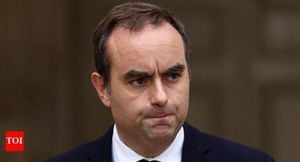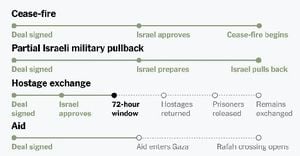Britain’s approach to asylum is undergoing a profound transformation, as the government announced this week that migrants granted asylum will no longer automatically receive settlement or family reunion rights. The sweeping reforms, unveiled on October 1 and 2, 2025, are part of Prime Minister Sir Keir Starmer’s bid to overhaul what he has called an “overly generous” and “not fit for purpose” system, according to statements reported by Reuters, Sky News, and the BBC. The changes are aimed at both tightening immigration controls and addressing the political pressures posed by surging support for the populist Reform UK party.
At the heart of the new policy is the removal of what critics called a “golden ticket” for refugees. For years, those granted asylum in the UK could qualify for permanent residence—known as indefinite leave to remain (ILR)—after five years, and could automatically sponsor immediate family members to join them. But from now on, permanent residence will not be guaranteed, and the family reunion route, suspended in September 2025, will not be reinstated. Instead, refugees will need to demonstrate their contribution to British society over a much longer period, with the qualifying period for settlement doubled to 10 years for most cases.
Prime Minister Starmer announced the changes ahead of the European Political Community (EPC) summit in Copenhagen, where he is co-chairing talks with other European leaders on tackling illegal migration. He stated, “I believe that if you want to come to the UK, you should contribute to our society. That is the tolerant and fair approach to migration that our communities are built on, but the current system is not fit for purpose. That is why we’re making fundamental changes to what those granted asylum are afforded in the UK. Settlement must be earned by contributing to our country, not by paying a people smuggler to cross the channel in a boat.”
The government’s rationale is clear: to reduce the “pull factors” that encourage dangerous and illegal crossings of the English Channel, particularly in small boats from France. According to the Home Office, the new policy “will bring an end to the unfair system that sees those crossing the channel in a small boat having greater rights to settlement and family reunion than those who arrive through proper legal routes and even British citizens.”
Home Secretary Shabana Mahmood, speaking earlier this week at the Labour conference, outlined the new requirements that migrants—including refugees—must meet to gain ILR. These include being in work, making national insurance contributions, not claiming benefits, learning English to a high standard, having a clean criminal record, and “truly giving back to the community” through volunteering. “The changes will bring an end to the unfair system,” she said, emphasizing that the new rules would apply equally to those arriving through legal and illegal routes.
The government also confirmed that refugees will no longer have the automatic right to bring their families to Britain, a significant departure from previous policy. The family reunion route, which allowed those granted asylum to sponsor immediate family members without meeting income or English language requirements, was suspended on September 1, 2025, as ministers reviewed asylum policy. Now, that suspension will become permanent, and new, stricter conditions will be set out later this autumn. In the interim, refugees face the same restrictions as other migrants, including minimum income thresholds and accommodation requirements.
According to BBC News, these changes are designed to make the system “fairer, in line with our European allies,” and to reduce incentives for asylum seekers to travel illegally to the UK, bypassing other safe countries. A government source told the BBC that Britain had been “overly generous” towards asylum seekers and that the reforms send a clear signal: “We get it, we will reduce the pull factors.”
The reforms are not limited to domestic policy. At the EPC summit, Starmer is expected to announce a new partnership with Denmark, backed by up to £3 million, to address the root causes of migration in Western Balkan countries. The UK will also increase its contribution to Italy’s Rome Process, a scheme aimed at reducing migration from Africa to Europe, from £4 million last year to £5.75 million. The government hopes these investments will encourage people to remain in their home regions and take up local employment, rather than embarking on dangerous journeys to the UK.
Starmer is also set to discuss how European countries can cooperate further on migration, including potential reforms to the European Convention on Human Rights (ECHR). While he has stated he does not want to “tear down” human rights laws, he is open to reviewing specific provisions, such as Article 3, which protects against torture and degrading treatment.
The Labour government’s focus on immigration comes amid mounting political pressure from Reform UK, which has led opinion polls in recent months. Reform UK has called for even stricter measures, including replacing ILR with visas that require migrants to reapply every five years. Meanwhile, the Conservative Party is set to hold its own conference in Manchester, where migration is expected to be a hot topic.
Critics of the new policy have been quick to respond. Shadow home secretary Chris Philp dismissed the changes as “another Starmer gimmick that will make no difference whatsoever.” The Refugee Council warned that ending family reunion rights could drive “more desperate people into the arms of smugglers in an effort to reunite with loved ones.” Former home secretary Yvette Cooper argued that the previous system was “not fair” and “not sustainable,” noting that more than a quarter of family homelessness applications were linked to refugee family reunion.
Despite these criticisms, the government insists that the UK will continue to provide “core protections” to genuine refugees fleeing persecution. Refugees will not be returned to their home countries if it would put them at risk, and they will be entitled to a basic package of support while they build their lives in the UK. However, the path to permanent settlement and family reunification will be longer and more demanding than ever before.
Full details of the reforms are expected to be set out in an Asylum Policy Statement later this autumn. Until then, the debate over Britain’s asylum system—and its place in a rapidly changing Europe—looks set to continue.
The government’s new approach marks a decisive break with the past, aiming to balance compassion with control and to send a clear message to would-be migrants and smugglers alike. Whether it will succeed in stemming the tide of small boat crossings or satisfy critics on all sides remains to be seen, but for now, Britain’s asylum landscape is being redrawn.






